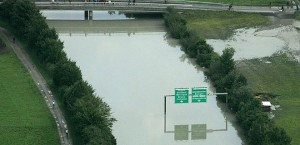Sometimes, the thing that frightens me most is not the rate of homicide, but how unpredictable nature is. In USA, flooding is the most frequent of natural disasters, so having the survival skills to cope with it might be more important than you think.
You might think it’s not that difficult to cope with it, precisely because it happens so often and everybody tries to warn you about it, but the fact is floods kill at least 100 people per year and the estimated damages value $4 billion. All of this happens because people tend to underestimate the power of a flood and overestimate their skills to prevent damages.
You need to go deeper into things than just taking a look on those leaflets that tell you in 2 or 3 cartoons what to do in such a situation. This is way too serious of an issue to be treated in comic strips!
Here are some steps you need to take if flood strikes:
1. Estimate Damages
Ask any expert you want, this is the most important thing to do in such a situation. How else can you prepare for the next steps? It will take you an hour to estimate the damages, and you can do it just by walking around your household. Imagine the worst of the worst occurs and that flooding will cause you the maximum amount of damages. What are the soft spots of your home? Where could the water invade first? And more importantly, what will the water do? Write everything down, from electrocution, to carpets and other textiles damage to injuries to your family and pets.
Evaluate the items near your house. How tall and stable are the trees, what is the likelihood that they will fall on your house and what will that do to it? How will your garden be affected by it? Involve all the members of your family in this discussion and think of all possible scenarios.
Afterwards, you will have to financially evaluate the damages. How much will it cost if disaster hits in the worst possible way? What will need repairing?
Then write what you can do to minimize the damages and implicitly, the costs to fix it. Calculate whether there is something you can do to prevent something from happening, and whether it is cheaper to prevent something than to repair it. According to your results, pick the best plan. If preventing disaster is cheaper, than you should start raising money, bit by bit, to waterproof your home. Have patience and be perseverant, it’s your life at stake.
2. Curiosity Didn’t Kill the Cat, It Saved It
With the risk of receiving redundant information, stay tuned to all means of communication and information and find out everything there is to know about flooding. Do your own research, but keep up to date with the news. Make a habit out of doing chores with your radio on. Ask around at your local planning agency anything that might help you, ask anyone who knows until they are sick of you.
More tips on how to cope with flooding next time!



No comments yet... Be the first to leave a reply!